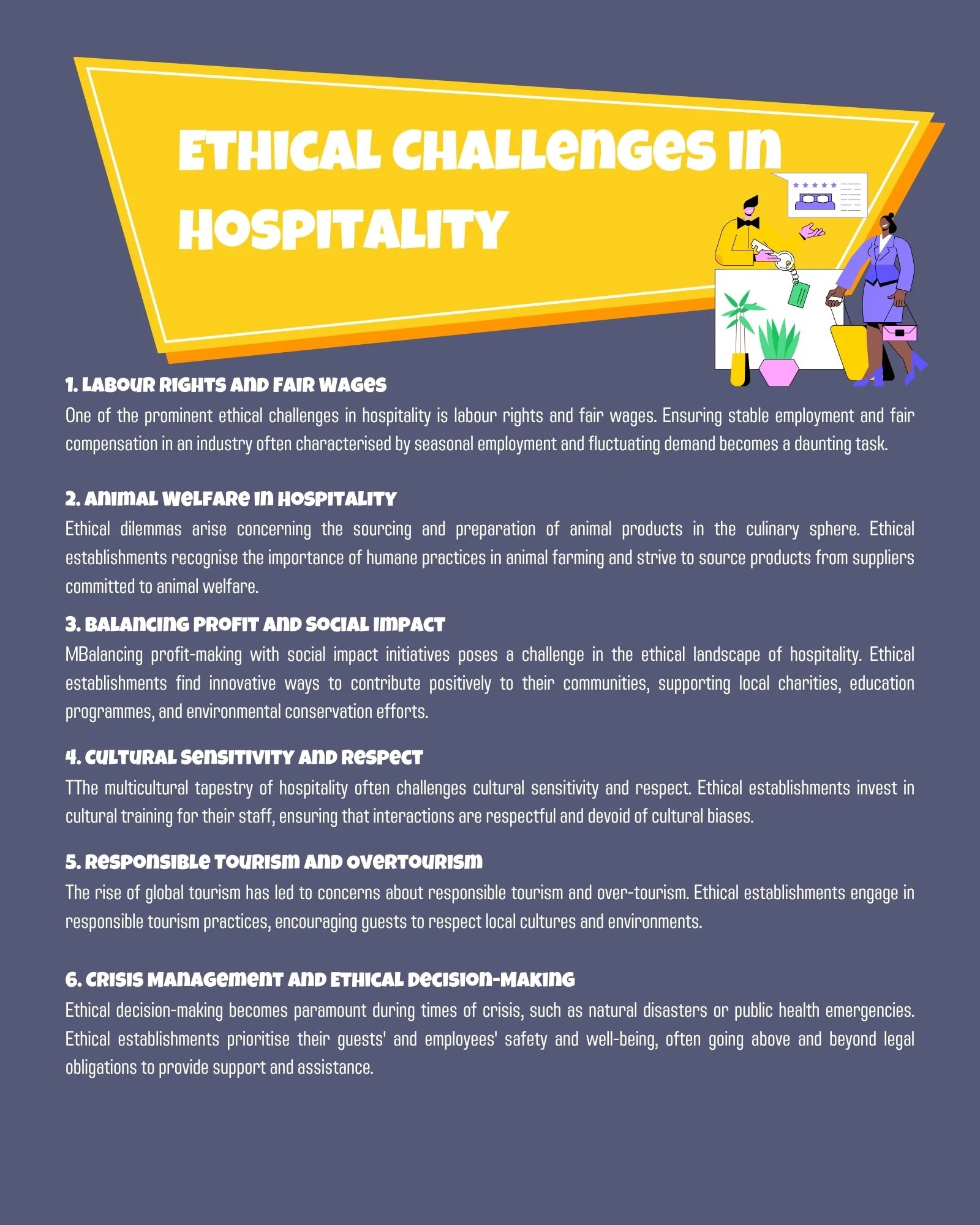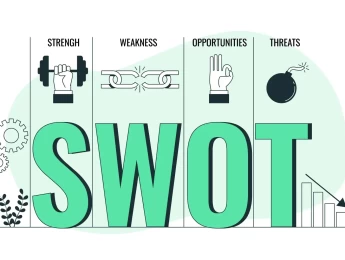- Table of Contents
- Introduction
- What Is Hospitality Ethics?
- The Importance of Prioritising Work Ethics in Your Business
- Building Trust and Fostering Loyalty
- Enhancing Reputation and Credibility
- Increasing Employee Performance and Morale
- Ensuring Long-Term Sustainability
- Adapting to Changing Consumer Expectations
- Fostering a Positive Work Environment
- Theoretical Background
- 1. Consideration of All Stakeholders:
- 2. Building Trust and Relationships:
- 3. Long-term Sustainability and Success:
- 4. Ethical Decision-Making and Crisis Management:
- 9 Important Hospitality Ethical Practices
- 1. Honesty and Integrity
- 2. Respect for Diversity
- 3. Confidentiality
- 4. Fair Treatment
- 5. Environmental Responsibility
- 6. Ethical Marketing and Advertising
- 7. Responsible Supply Chain Management
- 8. Responsible Alcohol Service
- 9. Community Engagement
- Codes of Ethics in Tourism and Hospitality Industries
- Guidelines for Ethical Conduct
- Facilitating Self-Regulation
- Alignment with Established Ethical Principles
- Recognition for Ethical Commitment
- Contributing to Industry-Wide Ethical Standards
- Adapting to Changing Dynamics
- The Future of Hospitality Ethics
- Enhanced Guest Experience through Personalisation
- Sustainable Practices Enabled by Smart Technology
- Blockchain for Transparent Supply Chain Management
- Ethical Considerations in AI and Automation
- Digital Ethics and Guest Data Security
- Ethical AI in Customer Service
- Ethical Challenges in Hospitality
- 1. Labour Rights and Fair Wages
- 2. Animal Welfare in Hospitality
- 3. Balancing Profit and Social Impact
- 4. Cultural Sensitivity and Respect
- 5. Responsible Tourism and Overtourism
- 6. Crisis Management and Ethical Decision-Making
- Conclusion
Introduction
In the bustling world of hospitality, where exceptional guest experiences and outstanding service are paramount, the role of ethics cannot be overstated. Hospitality ethics encompasses a set of principles and values that guide professionals in the industry towards maintaining integrity, fairness, and responsibility in their conduct. In this blog post, we will delve into the significance of prioritising work ethics in your hospitality business, explore the theoretical background and hypothesis development of hospitality ethics, and highlight nine important ethics that can help elevate your establishment's reputation. Additionally, we will touch upon the existence of codes of ethics in the tourism and hospitality industries, providing a comprehensive overview of this crucial topic.
What Is Hospitality Ethics?
Hospitality ethics goes beyond legal obligations and creates a culture of trust, respect, and transparency. It sets the moral compass for individuals and organisations in the hospitality industry, guiding their behaviour towards maintaining the highest standards of integrity and contributing to a positive and ethical guest experience.
The Importance of Prioritising Work Ethics in Your Business
When it comes to the success of your hospitality business, prioritising work ethics plays a pivotal role. The hotel industry has shown significant disregard for moral and ethical issues, according to research by Frontiers. These issues not only impact employee performance but also hinder the financial growth and long-term sustainability of hotels, which is one of the reasons why hotels should prioritise ethics. Here are some other reasons:
Building Trust and Fostering Loyalty
At the heart of ethical business practices in hospitality lies the establishment of trust. When guests check into a hotel or dine at a restaurant, they inherently trust the establishment to provide a safe, enjoyable, and reliable experience. Ethical conduct ensures that this trust is not only maintained but also fortified. When guests encounter honesty, transparency, and fairness, they are more likely to return. Loyal customers become the bedrock of any successful hospitality business, ensuring a consistent revenue stream and positive recommendations to potential guests.
Enhancing Reputation and Credibility
Ethical behaviour forms the cornerstone of a positive reputation. In the age of online reviews and social media, a single negative incident, if rooted in unethical conduct, can snowball into a public relations nightmare. Conversely, positive ethical behaviour generates glowing reviews, favourable ratings, and enthusiastic recommendations. These digital testaments are powerful marketing tools, attracting new guests more likely to trust an establishment with a spotless ethical track record.
Increasing Employee Performance and Morale
Ethics isn’t just about how a business interacts with its customers; it’s also about the internal culture it nurtures. When employees are treated fairly, given equal opportunities, and operate in an environment without discrimination or harassment, they are more motivated and productive. Ethical practices enhance job satisfaction and employee loyalty, leading to a committed and motivated workforce. Satisfied employees are more likely to deliver exceptional service, thereby enhancing the overall guest experience.
Ensuring Long-Term Sustainability
Ethics in hospitality aren’t a short-term investment; they’re a long-term commitment. Businesses that prioritise ethical practices lay the foundation for sustained success. A hospitality business creates a stable ecosystem that can weather market fluctuations and economic challenges by nurturing trust and loyalty, establishing a robust reputation, and maintaining a motivated staff. Ethical conduct ensures that the business is not just a flash in the pan but a lasting presence in the industry.
Adapting to Changing Consumer Expectations
The modern consumer is more informed and socially conscious than ever before. Ethical considerations, such as environmental responsibility and fair treatment of employees, have become significant factors in consumers' decision-making processes. Hospitality businesses that prioritise work ethics are not only meeting current expectations but also future-proofing themselves. Adapting to evolving ethical norms ensures that the business remains relevant and attractive to the socially aware consumers of tomorrow.
Fostering a Positive Work Environment
Ethical businesses prioritise fairness, respect, and inclusivity in the workplace. This results in satisfied employees and fosters a positive work environment characterised by collaboration, creativity, and innovation. When employees are confident in their workplace's ethical standards, they are more likely to contribute positively, leading to a vibrant and dynamic workplace culture.
In essence, prioritising work ethics in the hospitality industry is a multifaceted strategy that reaps substantial rewards. It’s not just about compliance; it’s about creating a culture where every stakeholder—guests, employees, management, and the community—feels valued, respected, and secure. Ethical hospitality businesses aren’t just providers of services; they are bastions of trust, beacons of integrity, and ideals of excellence. Through ethical conduct, a hospitality business doesn’t just succeed; it thrives, leaving a lasting imprint on the hearts of guests and the industry alike.
Theoretical Background
To truly understand the depth of hospitality ethics, delving into the theoretical perspectives that underpin its importance is essential. One such foundational theory that resonates profoundly in the hospitality industry is the Stakeholder Theory. Unlike traditional business models that primarily focus on maximising profits for shareholders, Stakeholder Theory posits that businesses should consider the interests of all stakeholders involved in their operations. In the hospitality context, stakeholders include shareholders, guests, employees, suppliers, and the wider community.
1. Consideration of All Stakeholders:
In ethical hospitality, every decision and action is weighed against the impact it might have on various stakeholders. For instance, in a hotel setting, guests expect exceptional service, a safe environment, and cultural sensitivity. Employees seek fair treatment, opportunities for growth, and a supportive work atmosphere. Suppliers aim for transparent and ethical business transactions, while the community surrounding the establishment looks for responsible corporate citizenship and support for local initiatives. By considering and accommodating the needs of all these stakeholders, a hospitality business creates a harmonious ecosystem where each element supports and sustains the other.
2. Building Trust and Relationships:
Stakeholder Theory emphasises that businesses are not isolated entities; they are woven into the fabric of society. Hospitality establishments build trust with stakeholders by prioritising ethical practices guided by this theory. When guests perceive a hotel or restaurant as ethically responsible, they feel more secure in their choice, fostering brand loyalty. Likewise, employees treated fairly and respectfully are more likely to be engaged, enhancing productivity and a positive workplace atmosphere. Ethical behaviour towards suppliers and the community reinforces the establishment's reputation, paving the way for long-lasting relationships.
3. Long-term Sustainability and Success:
Stakeholder Theory advocates for the long-term view of business success. While immediate profits are important, sustainable and ethical practices lead to enduring success. When a hotel or restaurant is regarded as ethically responsible, it attracts socially conscious guests and employees. Moreover, it encourages partnerships with suppliers who share similar values and garners support from the local community. These elements contribute to the business's sustainability and elevate its standing in the industry, making it a preferred choice for both guests and partners.
4. Ethical Decision-Making and Crisis Management:
Stakeholder Theory serves as a guide in ethical decision-making, especially in challenging situations. When a hospitality business faces a crisis, such as a negative incident or a public relations challenge, considering the interests of all stakeholders aids in making decisions that are not only legally compliant but also morally sound. Ethical crisis management, rooted in the principles of Stakeholder Theory, involves transparent communication, fair compensation when necessary, and a commitment to rectifying mistakes. By aligning actions with the needs and expectations of stakeholders, a business can navigate crises with integrity, minimising reputational damage and fostering a quicker recovery.
In essence, Stakeholder Theory forms the bedrock of ethical hospitality. It's not just a theoretical framework; it's a guiding philosophy that shapes the essence of hospitality businesses. By embracing this theory and translating its principles into tangible actions, the hospitality industry can truly embody ethical excellence, setting new standards for responsible business practices and ensuring a future where ethical conduct is not just a choice but an industry norm.
9 Important Hospitality Ethical Practices
In the intricate tapestry of hospitality, ethical principles serve as the threads that bind exceptional guest experiences and responsible business practices together. These principles not only define the industry's moral compass but also shape the character of hospitality establishments. Let’s take a closer look at the nine crucial ethical guidelines that form the foundation of ethical hospitality:
1. Honesty and Integrity
At the heart of ethical hospitality lies the commitment to honesty and integrity. This principle demands truthfulness in all interactions, from advertising services to guest interactions. By being sincere in promises and transparent communication, establishments build a foundation of trust upon which enduring relationships with guests and employees are built.
2. Respect for Diversity
The hospitality industry encounters individuals from diverse cultural, ethnic, and social backgrounds in its rich mosaic of global guests. Respecting diversity means more than acknowledging differences; it involves embracing them. Ethical establishments cultivate an atmosphere where every guest and employee feels welcomed, valued, and respected, regardless of their background or beliefs.
3. Confidentiality
The trust guests place in hospitality establishments includes the assurance that their personal information remains secure. Ethical hospitality businesses prioritise confidentiality, ensuring guest data is protected from unauthorised access. From reservation details to payment information, safeguarding sensitive data is not just a legal obligation but a fundamental ethical responsibility.
4. Fair Treatment
Ethical hospitality extends beyond the guest experience to encompass the treatment of employees. Fair treatment involves providing equal opportunities, fair wages, and a discrimination-free work environment. By fostering an inclusive atmosphere, establishments create a positive workplace culture, enhancing both employee satisfaction and guest experience.
5. Environmental Responsibility
In an era marked by environmental consciousness, ethical hospitality demands environmental responsibility. Establishments engaged in sustainable practices, such as waste reduction, energy conservation, and responsible sourcing. By minimising the ecological footprint, ethical hospitality meets the demands of socially conscious guests and contributes to the global environmental cause.
6. Ethical Marketing and Advertising
Transparency and honesty extend to marketing and advertising practices. Ethical establishments avoid deceptive tactics and ensure their promotions accurately represent their offerings. By providing accurate information, businesses build credibility, leading to guest trust and long-term relationships.
7. Responsible Supply Chain Management
Ethical responsibility transcends direct interactions with guests and employees. Responsible supply chain management encompasses supporting local businesses and using sustainable suppliers. By adopting ethical sourcing practices, hospitality establishments promote fairness and sustainability, positively impacting the wider community.
8. Responsible Alcohol Service
For establishments serving alcohol, responsible service is a paramount ethical consideration. Key components include adhering to legal requirements, promoting moderate consumption, and prioritising guest well-being by preventing overconsumption. By ensuring responsible alcohol service, businesses safeguard both guests and their own reputations.
9. Community Engagement
Ethical hospitality goes beyond the confines of the establishment and extends into the local community. Engaging with the community through support for local initiatives, charities, and events demonstrates social responsibility. By being active corporate citizens, hospitality businesses foster positive relationships, strengthen the community, and enhance their own reputation.
These nine ethical principles are not mere guidelines but the essence of hospitality’s moral fabric. These principles transform hotels and restaurants into sanctuaries of trust, respect, and responsible conduct when embraced and embodied. Ethical hospitality is not just a concept; it’s a commitment that shapes the industry and the experiences and perceptions of every guest it welcomes.
Ethical Principle | Scenario Example | Impact on Stakeholders |
Transparency in Pricing | Clearly detailing additional charges in room rates. | Informs guests; avoids surprises and dissatisfaction. |
Cultural Immersion Activities | Organising local cultural experiences for guests. | Enriches guest experience; supports local artisans/businesses. |
Sustainable Sourcing Practices | Procuring organic produce from local farmers. | Supports local economy; promotes eco-conscious agriculture. |
Employee Well-being Initiatives | Offering mental health support programmes for staff. | Enhances employee morale; fosters positive workplace culture. |
Community Development Partnerships | Collaborating with local schools for educational programmes. | Empowers communities; strengthens social bonds and goodwill |
Table 1: Practical scenarios for each ethical principle
Codes of Ethics in Tourism and Hospitality Industries
Establishing a set of ethical guidelines becomes paramount in the labyrinthine world of tourism and hospitality, where diverse cultures converge and myriad expectations interlace. This necessity has led to creating codes of ethics, meticulously crafted frameworks designed to steer the industry toward responsible, ethical practices. These codes, developed and embraced by professional organisations and industry associations, illuminate the path toward ethical conduct in an otherwise complex terrain.
Guidelines for Ethical Conduct
Codes of ethics in the tourism and hospitality industries are comprehensive documents that outline the expected standards of ethical behaviour. These guidelines touch upon many aspects, ranging from guest interactions to environmental sustainability. By providing clear and detailed standards, these codes offer businesses a tangible reference point, ensuring that ethical principles are not just lofty ideals but practical benchmarks that can be integrated into daily operations.
Facilitating Self-Regulation
One remarkable aspect of codes of ethics is their role in fostering self-regulation within the industry. By adhering to these guidelines, businesses actively shape an ethical standard for the entire sector. This self-regulation ensures a level playing field and fosters an environment where ethical conduct is not just a competitive advantage but a fundamental requirement.
Alignment with Established Ethical Principles
Codes of ethics are not standalone entities; they are carefully aligned with established ethical principles. By grounding themselves in universal values such as honesty, fairness, and respect, these codes ensure that businesses adhere to a moral compass that transcends geographical and cultural boundaries. This alignment not only fosters consistency in ethical behaviour but also enhances the industry’s reputation on a global scale.
Recognition for Ethical Commitment
Businesses that adhere to codes of ethics gain recognition for their commitment to ethical conduct. This recognition isn’t just a badge of honour; it’s a testament to the establishment’s integrity. Guests, particularly those prioritising socially responsible choices, are likelier to choose businesses recognised for their ethical commitments. Therefore, adherence to these codes elevates a business’s reputation and is a powerful marketing tool.
Contributing to Industry-Wide Ethical Standards
The tourism and hospitality industries are vast ecosystems with countless players. Codes of ethics play a pivotal role in creating industry-wide ethical standards. By establishing a collective commitment to responsible practices, these codes shape the behaviour of businesses, large and small. This collective effort enhances the industry’s credibility and contributes to the evolution of ethical norms, setting the stage for continuous improvement and innovation.
Adapting to Changing Dynamics
The tourism and hospitality landscape is dynamic, with new challenges and opportunities emerging constantly. Codes of ethics, while rooted in timeless principles, are adaptable documents. They can be revised and updated to address contemporary challenges, ensuring that the industry’s ethical standards remain relevant and robust. This adaptability allows businesses to navigate new ethical dilemmas effectively, fostering a culture of continuous ethical improvement.
In summary, codes of ethics in the tourism and hospitality industries are not just regulatory documents but ethical roadmaps guiding businesses toward responsible and sustainable practices. By adhering to these codes, businesses not only uphold their moral obligations but also actively contribute to creating an industry where ethical conduct is not just a choice but an unwavering norm. Embracing these codes isn’t just a compliance requirement; it’s a commitment to shaping an industry that stands on pillars of integrity, respect, and ethical excellence.
The Future of Hospitality Ethics
The hospitality industry landscape is undergoing a radical transformation, driven by rapid technological advancements and innovative solutions. As the industry hurtles into the future, the intersection between technology and ethics becomes a focal point, shaping how businesses operate, interact with guests, and uphold ethical standards. Embracing technology and innovation is not just a choice for hospitality establishments; it's an imperative that can redefine the very essence of ethical hospitality.
Enhanced Guest Experience through Personalisation
In the digital age, technology enables hyper-personalisation. Hotels and restaurants can leverage data analytics and artificial intelligence to understand guest preferences, from room temperature to dining choices. Ethical use of this data involves ensuring guests' privacy, being transparent about data collection, and utilising the information to enhance guest experience without compromising their trust. Personalised experiences, rooted in ethical data usage, delight guests and foster a sense of respect and understanding.
Sustainable Practices Enabled by Smart Technology
Sustainability is a cornerstone of ethical hospitality. Technology offers innovative solutions to minimise environmental impact. Smart thermostats, energy-efficient lighting, and IoT-enabled devices allow establishments to optimise resource usage. Ethical businesses embrace these technologies to reduce waste, conserve energy, and actively contribute to environmental conservation efforts. By incorporating sustainable practices enabled by technology, establishments fulfil their ethical obligations and appeal to eco-conscious guests.
Blockchain for Transparent Supply Chain Management
Transparency in the supply chain is a growing concern for socially responsible consumers. Blockchain technology provides an immutable ledger that can trace the journey of products and ingredients from their origin to the table. Ethical establishments use blockchain to ensure the authenticity of locally sourced products, fair trade practices, and sustainable sourcing. By embracing this technology, businesses enhance transparency, build trust with guests, and uphold ethical standards in their supply chain operations.
Ethical Considerations in AI and Automation
The rise of artificial intelligence and automation presents ethical considerations, particularly in the context of employment. Ethical businesses ensure that implementing AI and automation does not lead to mass layoffs but is instead used to enhance efficiency, allowing human employees to focus on tasks that require empathy, creativity, and personal touch. Upholding ethical principles involves investing in employee training and development to adapt to technological changes, ensuring a harmonious balance between innovation and ethical employment practices.
Digital Ethics and Guest Data Security
As digital interactions become ubiquitous, ensuring guest data security is paramount. In fact, customers now tend to favour businesses they trust to handle their data responsibly, influencing their choices and transactions, according to Atlan. Ethical establishments invest in robust cybersecurity measures, encrypting guest information and safeguarding it against breaches. Moreover, businesses are transparent with guests about data usage, seeking explicit consent for its collection and ensuring its ethical and responsible management. Ethical handling of digital data safeguards guests’ privacy and fortifies the establishment’s reputation as a trustworthy entity.
Ethical AI in Customer Service
Artificial intelligence is reshaping customer service, with chatbots and virtual assistants becoming commonplace. Ethical AI in hospitality ensures that these AI-driven interactions are transparent and clearly identified. It also means programming AI with ethical guidelines, avoiding biased responses and ensuring respectful and empathetic communication. Even though AI is said to enhance the customer service experience, statistics show that the majority of consumers, accounting for 61%, express a preference for human understanding over AI when it comes to their needs. By adopting ethical AI practices, businesses enhance efficiency while preserving the human touch that defines ethical hospitality.
In the rapidly evolving landscape of technology and innovation, ethical considerations are not a hindrance but a compass guiding the industry toward a future where hospitality is both technologically advanced and morally grounded. Embracing these advancements with ethical integrity ensures the industry’s relevance and paves the way for a future where technology is harnessed for the betterment of guest experiences, employee well-being, and the global community. The future of hospitality ethics lies not just in the adoption of technology but in the ethical wisdom with which it is embraced and integrated into the very fabric of the industry.
Ethical Challenges in Hospitality
While the principles of ethical conduct in hospitality are well-established, the industry often encounters complex challenges that dwell in the grey areas between right and wrong. These ethical dilemmas demand careful consideration and thoughtful navigation. Let’s explore some of these challenges, shedding light on how hospitality professionals can navigate these intricate moral landscapes:

1. Labour Rights and Fair Wages
One of the prominent ethical challenges in hospitality is labour rights and fair wages. Ensuring stable employment and fair compensation in an industry often characterised by seasonal employment and fluctuating demand becomes a daunting task. Ethical establishments proactively engage in fair wage practices, offering competitive salaries, benefits, and growth opportunities. By investing in their workforce, businesses uphold ethical standards and create a motivated and loyal team, enhancing guest experience and employee satisfaction.
2. Animal Welfare in Hospitality
Ethical dilemmas arise concerning the sourcing and preparation of animal products in the culinary sphere. Ethical establishments recognise the importance of humane practices in animal farming and strive to source products from suppliers committed to animal welfare. Additionally, some businesses opt for plant-based alternatives, catering to the growing demand for ethical dining options. By embracing these choices, establishments navigate the ethical complexities of animal welfare, appealing to a wider range of socially conscious guests.
3. Balancing Profit and Social Impact
Balancing profit-making with social impact initiatives poses a challenge in the ethical landscape of hospitality. Ethical establishments find innovative ways to contribute positively to their communities, supporting local charities, education programmes, and environmental conservation efforts. While profitability is essential for sustainability, ethical businesses navigate the grey area by allocating a portion of their earnings toward meaningful social endeavours, ensuring a balance between economic success and social responsibility.
Ethical Dilemma | Ethical Approach | Impact on Stakeholders |
Living Wage Initiatives | Implementing fair wage policies and career growth. | Motivated employees, positive social impact, loyal workforce |
Ethical Sourcing in Cuisine | Collaborating with ethical suppliers promoting local artisans | Support ethical producers, enhances culinary diversity |
Social Responsibility Programmes | Allocating a percentage of profits to local charities | Positive community impact, enhanced corporate reputation |
Diverse and Inclusive Policies | Providing diversity training, embracing inclusivity in all operations | Diverse guest satisfaction, respectful, inclusive environment |
Responsible Tourism Advocacy | Educating guests on responsible travel practices. | Preserve local culture, minimise negative environmental impact. |
Table 2: Approaches for each ethical challenge in hospitality
4. Cultural Sensitivity and Respect
The multicultural tapestry of hospitality often challenges cultural sensitivity and respect. Ethical establishments invest in cultural training for their staff, ensuring that interactions are respectful and devoid of cultural biases. From dietary preferences to religious practices, ethical hospitality professionals navigate these challenges by fostering an inclusive environment, where every guest feels acknowledged, valued, and respected.
5. Responsible Tourism and Overtourism
The rise of global tourism has led to concerns about responsible tourism and over-tourism. Ethical establishments engage in responsible tourism practices, encouraging guests to respect local cultures and environments. Furthermore, they actively participate in community development initiatives, mitigating the negative impacts of over-tourism. By embracing responsible tourism, hospitality businesses navigate the complexities of managing influxes of visitors while preserving the authenticity and well-being of the local community.
6. Crisis Management and Ethical Decision-Making
Ethical decision-making becomes paramount during times of crisis, such as natural disasters or public health emergencies. Ethical establishments prioritise their guests' and employees' safety and well-being, often going above and beyond legal obligations to provide support and assistance. Transparent communication, fair compensation, and ethical crisis management strategies ensure businesses navigate crises while upholding their moral obligations and reputation.
The grey areas of ethical challenges in hospitality require a delicate balance between economic viability and social responsibility. Ethical establishments understand that navigating these challenges isn’t about finding shortcuts or evading complexities; it’s about embracing them head-on with transparency, empathy, and a genuine commitment to ethical principles. By doing so, hospitality professionals overcome ethical dilemmas and set new standards for ethical conduct in the industry, reinforcing the sector's reputation as a beacon of integrity and responsibility.
Conclusion
Prioritising work ethics in your hospitality business is a moral obligation and a strategic decision that impacts your success and sustainability. Upholding honesty, integrity, respect, fairness, and environmental responsibility sets the foundation for long-term success. Adhering to important hospitality ethics builds trust, enhances your reputation, and creates a positive guest experience. Embracing codes of ethics and engaging with the local community contribute to the tourism and hospitality industries' overall development and ethical growth. Remember, ethical conduct is not only the right thing to do but also a key driver of success in the world of hospitality.
























